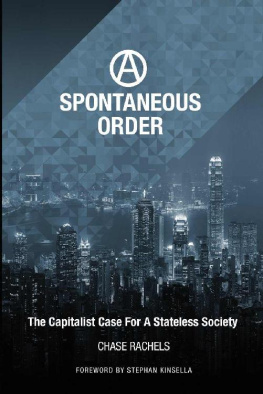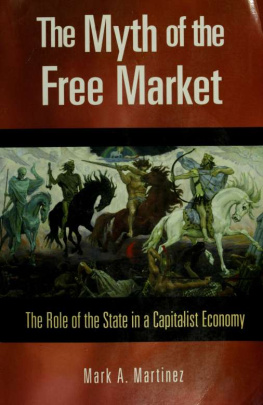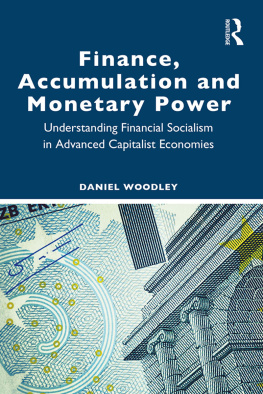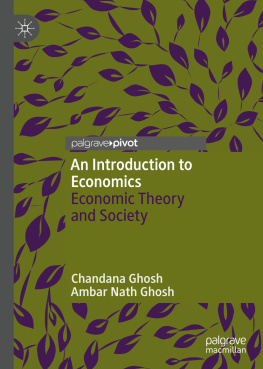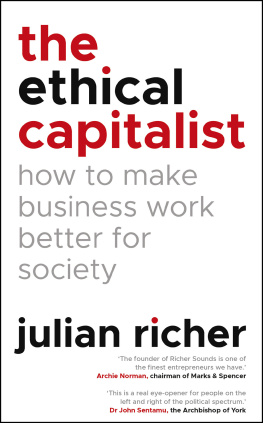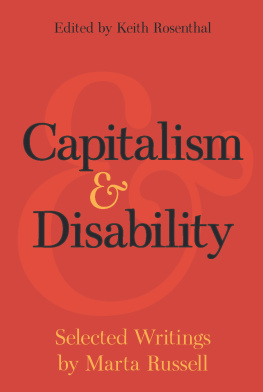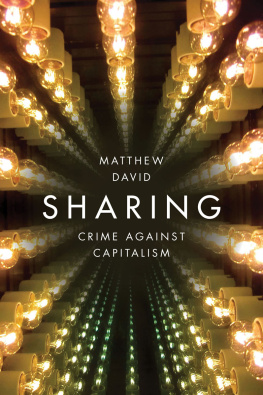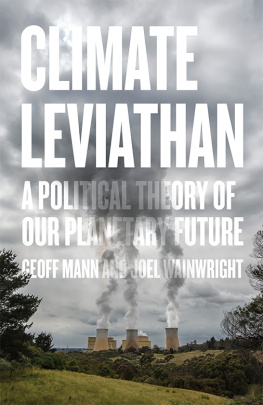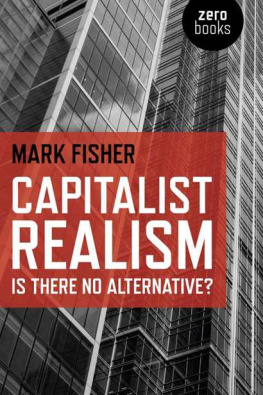This work is dedicated to my son, Micha Rachels . May he grow upwith a free spirit, critical mind, and warm heart.
I would like to first and foremost thankmy wife, Michelle Ferris, for standing by my side as an active participant inthe fight against tyranny. Herloving encouragement and support enabled me to see this project to its end. Stephan Kinsellas mentorship waslikewise invaluable in its relation to the precision and rigor of thisbook. My editor, Mattheus von Guttenberg, also deserves recognition for hisprofessional assistance in editing this work and verifying the accuracy of itscontent. I would like to express mygratitude for Will Porter, who was gracious enough to contribute one of hisbrilliant essays (Chapter 0: Epistemology and Praxeology). I would also like togive thanks to the following people who provided their support in a variety ofways, though bear in mind this list is by no means exhaustive or in anyparticular order: Luis F. Duran- Aparicio , Blake Williams, Jason Bassler ,Justin Stout, Chris Calton , Gary Simon, Mike Martelli , Joel Richardson, Walter Block, Jeff Berwick, andmany more!
Foreword
Modernlibertarian theory is only about five decadesold. The ideas that have influenced our greatest thinkers can be traced backcenturies, of course , to luminaries such asHugo Grotius, John Locke, Thomas Paine, Herbert Spencer, David Hume, and JohnStuart Mill, and to more recent and largely even more radical thinkers such asGustave de Molinari, Benjamin Tucker, Lysander Spooner, Bertrand de Jouvenel,Franz Oppenheimer, and Albert Jay Nock.
The beginnings of the modernmovement can be detected in the works of the three furies of libertarianism,as Brian Doherty calls them: Rose Wilder Lane, Ayn Rand, and Isabel Patterson,whose respective books The Discovery ofFreedom, The Fountainhead, and The God of the Machine were allpublished, rather remarkably, in the same year: 1943. But in its more modern form, libertarianism originated in the1960s and 1970s from thinkers based primarily in the United States, notably AynRand and Murray Rothbard. Other significant influences on the nascentlibertarian movement include Ludwig von Mises, author of Liberalism (1927) and HumanAction (1949, with a predecessor version published in German in 1940);Nobel laureate F.A. von Hayek, author of TheRoad to Serfdom (1944); Leonard Read, head of the Foundation for EconomicEducation (founded 1946); and Nobel laureate Milton Friedman, author of theinfluential Capitalism and Freedom(1962).
The most prominent and influential ofmodern libertarian figures, however, were the aforementionednovelist-philosopher Ayn Rand, the founder of Objectivism and a radical forcapitalism, and Murray Rothbard, the Mises-influenced libertariananarcho-capitalist economist and political theorist. Rothbards seminal role is widely recognized, even by non- Rothbardians .Objectivist John McCaskey, for example, has observed, that out of the debatesin the mid-1900s about what rights citizens ought to have,
grew the main sort of libertarianism of the last fiftyyears. It was based on a principle articulated by Murray Rothbard in the 1970sthis way: No one may initiate the use or threat of physical violence againstthe person or property of anyone else. The idea had roots in John Locke,Americas founders, and more immediately Ayn Rand, but it was Rothbards formulation that became standard. It becameknown as the non-aggression principle orsince Rothbard took it asthe starting point of political theory and not the conclusion of philosophicaljustificationthe non-aggression axiom. In the late twentiethcentury, anyone who accepted this principle could call himself, or could findhimself called, a libertarian, even if he disagreed with Rothbards own insistence that rights are best protected when there is no government atall.
We can date the dawn of todayslibertarianism to the works of Rand and Rothbard: to Rands Atlas Shrugged (1957); and, especially,to Rothbards Man,Economy, and State (1962), Power andMarket (1970), and For A New Liberty(1973), plus his journal The LibertarianForum (19691984). For A NewLiberty stands today as a brilliant, and early, bold statement of theradical libertarian vision. By the mid-60s, the modern libertarian movement wascoalescing, primarily behind the non-initiation of force principle and theradical capitalism of Ayn Rand, and Rothbards systematic libertarian corpus based upon the non-aggression principle or axiom.It is no surprise that the Libertarian Party was founded in 1971, as theseideas, and the liberty movement, were gaining steam.
In the ensuing decades many otherinfluential works appeared expounding on the libertarian idea, such as Lindaand Morris Tannehill, The Market forLiberty (1970), John Hospers, Libertarianism:A Political Philosophy for Tomorrow (1971), David Friedman, The Machinery of Freedom (1973), Robert Nozick , Anarchy,State, and Utopia (1974), Henri Lepage , Tomorrow, Capitalism (1978), SamuelEdward Konkin III, New Libertarian Manifesto (1980), Jan Narveson ,The Libertarian Idea (1988), Anthonyde Jasay , Choice,Contract, Consent: A Restatement of Liberalism (1991), Richard Epstein, Simple Rules for a Complex World (1995),Charles Murray, What It Means to Be aLibertarian: A Personal Interpretation (1996), David Boaz, Libertarianism: A Primer (1998), RandyE. Barnett, The Structure of Liberty(1998), and, more recently, Jeffrey A. Mirons Libertarianism, From A to Z (2010),Jacob Hueberts LibertarianismToday (2010), Gary Chartiers The Conscience of an Anarchist (2011),and Gerard Caseys Libertarian Anarchism(2012).
These and other works expounding onthe ideas of liberty have their own strengths and merits, and many of them havetheir own deficiencies and idiosyncrasies as well. Some, for example, arestatements only of the authors personal vision and do not purport to describelibertarian thought in general; some are minarchist ,at best, and do not even recognize anarcho-libertarianism as a type oflibertarianism ( Miron , for example, sayslibertarianism accepts a role for government in a few, limited areas: smallgovernment, not anarchy); and some do notsufficiently appreciate Austrian economics and its crucial role in informingpolitical theory. And many of the earlier works are simply dated at thispointhow could they not be, being written before the rise of theInternet (1995) or even before the fall of communism (198991)?
As libertarian thought develops andmatures, there is a continual need to restate our basic principles, to searchfor new ways of understanding and conveying our views about the nature of humansociety, the state, conflict, cooperation, and liberty. The way forward, if wewish to spread and develop the intellectual edifice of libertarian thought, isto extend and advance the most consistent, scientific, and rigorous foundationfor libertarianism. This is, in my view, the basic vision laid out by Rothbard,which relies heavily on free market economic theory, chiefly that of Rothbards mentor Mises, and as supplemented by the work of Rothbards colleague and protg Hans-Hermann Hoppe,author of

